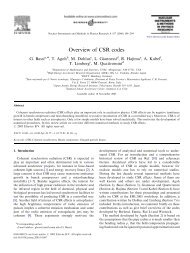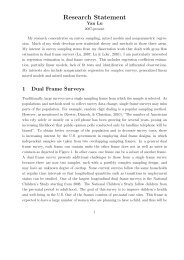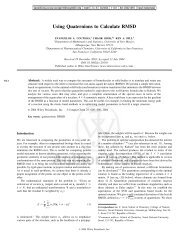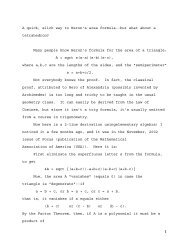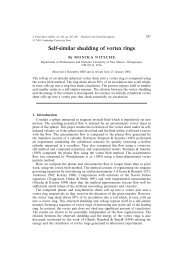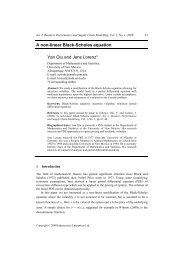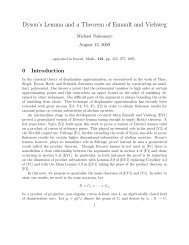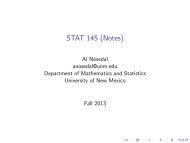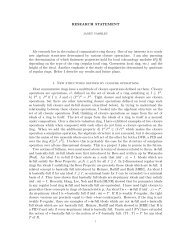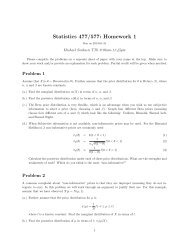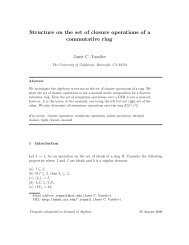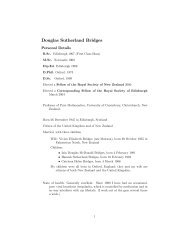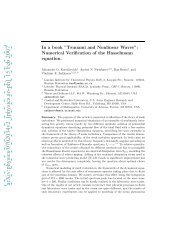OEO Office of Equal Opportunity - Department of Mathematics and ...
OEO Office of Equal Opportunity - Department of Mathematics and ...
OEO Office of Equal Opportunity - Department of Mathematics and ...
You also want an ePaper? Increase the reach of your titles
YUMPU automatically turns print PDFs into web optimized ePapers that Google loves.
PSYCHOLOGY 275<br />
Spring semester: None accepted.<br />
Summer session: None accepted.<br />
Only those applications received <strong>and</strong> completed by January<br />
15 are guaranteed to receive consideration. Early applications<br />
are strongly encouraged.<br />
Degrees Offered<br />
Ph.D. in Psychology with M.S. Enroute<br />
Concentrations: clinical, cognitive/learning, developmental,<br />
evolutionary, behavioral neuroscience, cognitive neuroscience<br />
<strong>and</strong> quantitative/methodology.<br />
A graduate student who elects psychology as a major subject<br />
is advised to have had at least 15 semester hours <strong>of</strong> college<br />
credit in psychology, including one course in psychological<br />
statistics <strong>and</strong> either a laboratory course or independent<br />
research in psychology.<br />
Although the <strong>Department</strong> awards the M.S. degree (with<br />
thesis) under Plan I according to the regulations set forth in<br />
earlier pages <strong>of</strong> this catalog, all screening <strong>of</strong> new applicants is<br />
done in terms <strong>of</strong> entry for the Ph.D. program. The department<br />
will admit new students to the graduate program only for the<br />
fall semester <strong>of</strong> each year; exceptions to this procedure are<br />
rare. Since competition for the few available openings each<br />
year is strong, only students with excellent academic records<br />
as well as first-rate letters <strong>of</strong> recommendation are likely to<br />
succeed in gaining admission.<br />
Graduate Record Examination (GRE) scores, including the<br />
Psychology Subject Test, are required as part <strong>of</strong> the application<br />
procedure.<br />
Clinical Concentration<br />
First year course work for clinical students. Clinical students<br />
also begin their core sequence in clinical psychology<br />
during the first year. They are required to complete each<br />
course with a grade <strong>of</strong> “B-” or better. The current course<br />
sequence is:<br />
FALL TERM<br />
PSY 532 Seminar in Psychopathology (3 hrs.)<br />
PSY 600L Clinical Interviewing (1 hr.)<br />
PSY 631L Practicum in Psychotherapy with Adults I<br />
(Must be taken every Fall semester)<br />
SPRING TERM<br />
PSY 600L Case Formulation (1 hr.)<br />
PSY 633 Systems <strong>of</strong> Psychotherapy (3 hrs.)<br />
PSY 650 Diversity Issues in Clinical Psychology (3 hrs.)<br />
PSY 650 Ethics & the Pr<strong>of</strong>ession <strong>of</strong> Psychology (3 hrs.)<br />
PSY 632L Practicum in Psychotherapy with Adults II<br />
(Must be taken every Spring semester)<br />
Second year course work for clinical students. During the<br />
second year, students in the clinical concentration complete<br />
their core course work. The current sequence is:<br />
FALL TERM<br />
PSY 600L Pre-Clinical Practicum (1 hr.)<br />
PSY 533 Psychological Evaluation: Cognitive <strong>and</strong><br />
Neuropsychology Functions (3 hrs.)<br />
PSY 535 Psychological Evaluation:<br />
Personality Functions (3 hrs.)<br />
PSY 631L Practicum in Psychotherapy with Adults I<br />
(Must be taken every Fall semester)<br />
SPRING TERM<br />
ARTS AND<br />
SCIENCES<br />
General requirements for the Ph.D. are set forth in earlier<br />
pages <strong>of</strong> this catalog. Regulations include a minimum <strong>of</strong><br />
48 hours <strong>of</strong> graduate credits (precise requirements depends<br />
upon area) with a grade point average <strong>of</strong> 3.0 (B) or better,<br />
exclusive <strong>of</strong> thesis <strong>and</strong> dissertation; satisfactory performance<br />
on the doctoral comprehensive examination; <strong>and</strong> a dissertation<br />
accepted by the final oral examining committee.<br />
The <strong>Department</strong> <strong>of</strong> Psychology considers both teaching <strong>and</strong><br />
research to be essential aspects <strong>of</strong> doctoral training <strong>and</strong>,<br />
therefore, requires that all c<strong>and</strong>idates have such experiences<br />
during their tenure. These requirements apply regardless <strong>of</strong><br />
whether remuneration for such activities is received.<br />
Required Core Courses<br />
(All Concentrations)<br />
The following core courses are required in addition to any<br />
courses required in the student’s concentration.<br />
FALL TERM OF FIRST YEAR<br />
PSY 501 Advanced Statistics (3 hrs.)<br />
PSY 503L Advanced Statistics Lab (1 hr.)<br />
PSY 505 Research Seminar (1 hr.)<br />
PSY 551 Graduate Problems (1–3 hrs.)<br />
SPRING TERM OF FIRST YEAR<br />
PSY 502 Design <strong>and</strong> Analysis <strong>of</strong> Experiments (3 hrs.)<br />
PSY 504L Design <strong>and</strong> Analysis <strong>of</strong> Experiments Lab (1 hr.)<br />
PSY 505 Research Seminar (1 hr.)<br />
PSY 551 Graduate Problems (1–3 hrs.)<br />
Additional required course that is sometimes taken during<br />
the first year:<br />
PSY 511 History <strong>and</strong> Systems <strong>of</strong> Psychology (3 hrs.)<br />
Note: This course does not have to be taken during a<br />
student’s first year, but it does have to be taken prior<br />
to a student’s comprehensive exams.<br />
PSY 534L Practicum in Psychological Evaluation (3 hrs.)<br />
PSY 633 Systems <strong>of</strong> Psychotherapy (3 hrs.)<br />
PSY 632L Practicum in Psychotherapy with Adults II<br />
(Must be taken every Spring semester)<br />
While students in all concentrations are encouraged to take<br />
courses in concentrations other than their own, nonclinical<br />
students ordinarily are not permitted to enroll in clinical practice<br />
(600L). Nonclinical students who wish to enroll in this<br />
clinical course must discuss this with the Director <strong>of</strong> Clinical<br />
Training <strong>and</strong> the course instructor.<br />
There will be additional requirements for meeting training<br />
requirements <strong>of</strong> the American Psychological Association<br />
(APA). Please see the Director <strong>of</strong> Clinical Training for additional<br />
information.<br />
Health Psychology Concentration<br />
Beyond the departmental required courses Health Psychology<br />
students will be required to complete nine credit hours (three<br />
courses) <strong>and</strong> two electives listed below. Up to two electives<br />
can be taken from the Public Health electives.<br />
Required courses:<br />
PSY 512 Advanced Health Psychology<br />
PSY 513 Emotion <strong>and</strong> Health<br />
PSY 514 Health Psychology Interventions<br />
Electives from psychology:<br />
PSY 530 Alcoholism<br />
PSY 532 Seminar in Psychopathology<br />
PSY 547 Drugs <strong>and</strong> Behavior<br />
Electives from Public Health:<br />
PH 501 Principles <strong>of</strong> Public Health<br />
PH 504 Rural Health<br />
PH 505 Cultural, Social <strong>and</strong> Behavioral Theory <strong>and</strong><br />
Health<br />
PH 507 Health Care Systems<br />
PH 562 Women’s Health Issues<br />
UNM CATALOG 2006–2007 Symbols, page 611.



